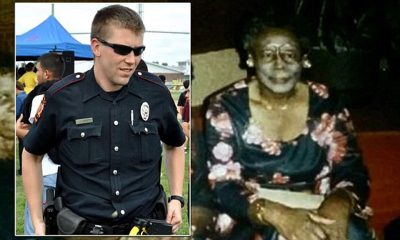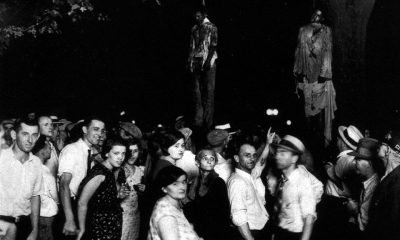States
Exploring Strategies To Safeguard Youth From The Impact Of Racism: Insights From The Bennett Lecture

Exploring Strategies To Safeguard Youth From The Impact Of Racism: The Edna Bennett Pierce Preventive Research Center hosted a captivating presentation by Dr. Velma K. Murry, a leading preventive scientist, on her revolutionary work shielding adolescents from racism. For over two decades, Dr. Murry’s study has given young people, especially Black people, hope.
Dr. Murry’s study has shown protective variables that prevent Black adolescents from mental instability and dangerous conduct. Her groundbreaking Strong African American Families (SAAF) and Positive African American Sisters (PAAS) programs were carefully created and tested to offer a successful intervention method.
These interventions have improved family dynamics, parenting, and Black youth’s intrapersonal protective factors. These include promoting positive racial identity, resistance efficacy, future orientation, and prosocial peer groups. These measures have had an enormous effect.
The reduction of early sexual onset, drug addiction, and behavioral issues among Black kids is one of these programs’ most significant achievements. Additionally, the interventions have reduced depression and behavioral health inequities caused by racial prejudice.
Disseminating Hope: Taking Saaf And Paas To Real-world Settings
Dr. Murry wants to spread the SAAF and PAAS programs to real-world situations where they’re required. She sees similar initiatives in community-based groups, schools, primary healthcare institutions, and faith-based organizations.
She wants to examine the programs’ usefulness on a larger scale by moving her study out of the lab and into neighborhoods where Black adolescents confront prejudice. This method directly tackles Black youth’s inequities and concerns, marking a breakthrough in the fight against racism. Dr. Murry’s commitment to making these programs available to a broad audience stresses the importance of aiding underprivileged kids.
Safeguard Youth From The Impact Of Racism: Dr. Velma K. Murry’s Work
University Distinguished Professor Velma K. Murry holds the Lois Autrey Betts Endowed Chair at Vanderbilt University in addition to her research and academic activities. Her impact extends to the medical school’s Health Policy Department and Peabody College’s Human and Organizational Development Department. She co-directs Vanderbilt University Medical Center’s Institute of Medicine and Public Health Health Equity Research Program.
Dr. Murry’s achievements go beyond academia. She serves on the National Advisory Mental Health Council and participates in National Academies of Science, Engineering, and Mathematics activities. Past president of the Society for Research on Adolescence and head of the American Psychological Association Committee on Psychology and AIDS, her career is exceptional.
Dr. Velma K. Murry highlights the need to shield Black adolescents from prejudice. Her groundbreaking study and the SAAF and PAAS initiatives provide young Black people hope for the future. Dr. Murry is leading the fight against racism by addressing its impacts and bringing proven therapies to real-world situations, promising the Black community a better future.
The Importance Of Early Intervention
Dr. Velma K. Murry’s study shows that early intervention protects Black adolescents against racism. Racial prejudice has been shown to affect youth mental and emotional health negatively. Over time, these encounters might cause stress, despair, and dangerous behavior.
SAAF and PAAS programs help interrupt this pattern via early intervention. These programs create resilience in Black adolescents by teaching them to overcome racial prejudice and promoting positive racial identity, resistance efficacy, and prosocial peer relationships.
Early intervention reduces racism’s immediate and long-term impacts, according to research. It may prevent or minimize drug misuse, early sexual onset, and behavioral issues, improving Black kid’s well-being.
Read Also: Revealing Racial Disparities In Healthcare: The Impact Of Racism On Black Patients
Bridging The Gap: Community-based Implementation
Dr. Murry prioritizes connecting academic research to underserved areas. Her dedication to bringing SAAF and PAAS to community-based groups, schools, primary healthcare institutions, and faith-based organizations is vital.
Implementing these programs in real-world contexts helps assess their efficacy and adaptability. It addresses the difficulties Black adolescents confront in diverse areas and tailors remedies. By incorporating parents, educators, healthcare professionals, and spiritual leaders, these initiatives work together to safeguard Black adolescents against racism.
This Technique Addresses Racism At Several Levels In A Community, Giving A Comprehensive And Systemic Solution To A Chronic Problem.
Dr. Velma K. Murry’s Legacy In Prevention Science
Dr. Velma K. Murry’s preventative science legacy goes beyond a brief answer to an urgent situation. Her work to safeguard Black adolescents from racism has increased awareness and generated life-changing remedies.
Dr. Murry pioneered the SAAF and PAAS programs and spread them to real-world situations, raising the bar for preventative research. Her work in national mental health programs, Black adolescent well-being, and professional leadership has left an everlasting imprint.
Her legacy motivates future scholars, policymakers, and community leaders to battle racism’s impacts on youngsters and create effective solutions that make a difference. Dr. Velma K. Murry’s work shows how research, education, and community participation may make society more fair and just.
Evidence-based Success And Long-term Impact
The empirical data and long-term influence on Black adolescents make Dr. Velma K. Murry’s Strong African American Families (SAAF) and Positive African American Sisters (PAAS) programs successful.
These evidence-based strategies have worked in study and real life. SAAF and PAAS programs have consistently improved parental, family, and intrapersonal protective factors in Black kids.
Positive racial identity and resistance efficacy help fight prejudice. The interventions have also significantly reduced early sexual onset, drug misuse, and behavioral issues among Black kids.
Dr. Murry’s initiatives are founded on research, making them dependable resources for addressing racism’s effects on kids. These projects demonstrate the long-term power of research and community-based interventions.
Collaboration And Stakeholder Engagement
Collaboration and stakeholder involvement define Dr. Velma K. Murry’s approach. Dr. Murry engages stakeholders because she knows racism’s consequences on Black adolescents necessitate a multidisciplinary and community-based practice.
Academics, parents, educators, healthcare practitioners, church leaders, and youngsters collaborate. By incorporating these varied viewpoints and experiences, Dr. Murry ensures that therapies are culturally sensitive, adaptive, and tailored to each community.
Community members own and empower themselves by protecting their young via stakeholder participation. This collaborative approach enhances treatments and creates a network of support and advocacy for Black kids facing racial injustice.

-

 States2 weeks ago
States2 weeks agoPearlie Golden 93-Year-Old Black Woman Shot By Texas Cop
-

 States2 weeks ago
States2 weeks agoTragedy Unveils Racial Tensions Tarika Wilson Story
-

 States2 weeks ago
States2 weeks agoLayers Of Racial Tension The Mario Woods Tragedy And San Francisco Path To Justice
-

 States2 weeks ago
States2 weeks agoLynching Of Thomas Shipp Tragedy Of Racism Echoes Through History
-

 States2 weeks ago
States2 weeks agoThe Killing Of Terence Crutcher And The Fight For Racial Justice

















You must be logged in to post a comment Login